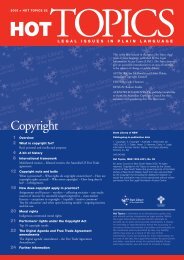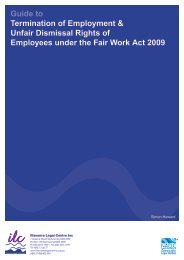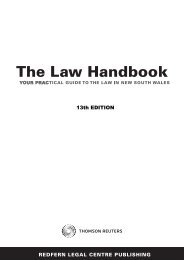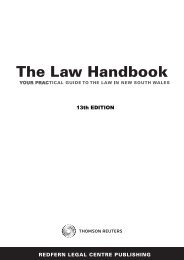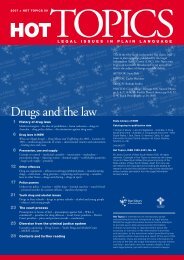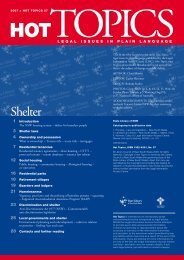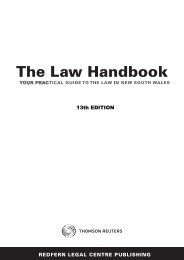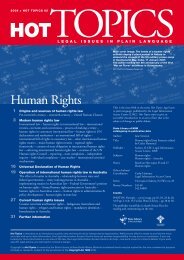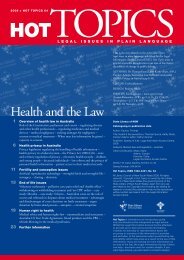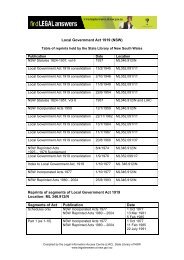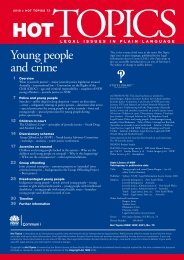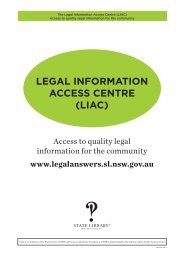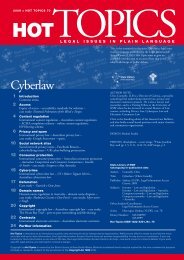Terrorism - Hot Topics 58 - Legal Information Access Centre
Terrorism - Hot Topics 58 - Legal Information Access Centre
Terrorism - Hot Topics 58 - Legal Information Access Centre
- No tags were found...
You also want an ePaper? Increase the reach of your titles
YUMPU automatically turns print PDFs into web optimized ePapers that Google loves.
Australiananti-terrorism lawsafter 11 september 2001, the australiangovernment has adopted more anti-terrorismlaws than almost any other country, includingthe united states and Britain. By october 2006,the australian parliament had passed 40 antiterrorismstatutes, some of them introducingradical changes to australian law.new TerrOrism OffenCesBefore 2002, terrorist acts in Australia would have been prosecuted as ordinary crimes (such as murder, assault, or arson), or as offences against aircraft or ships and so on (which implement Australia’s obligations under antiterrorismtreaties: see p 6). This position was transformed by the Security Legislation Amendment (<strong>Terrorism</strong>) Act 2002, which introduced a definition of terrorism into Australian law (see p 2) and created numerous terrorism offences based on that definition (Divisions 101 and 103 of the Commonwealth Criminal Code), including:> engaging in a terrorist act;> providing or receiving training connected with terrorist acts;> possessing things connected with terrorist acts;> collecting or making documents likely to facilitateterrorist acts;> other acts done in preparation for, or planning,terrorist acts;> financing terrorism.banning TerrOrisT OrganisaTiOnsNew laws after 9/11 allow for the listing of organisationsas terrorist, and for the prosecution of those involvedwith such organisations (Division 102 of the CriminalCode). An organisation can be identified as a terroristorganisation in two ways. First, since 2004, an organisationcan be listed in Regulations if the CommonwealthAttorney-General is satisfied on reasonable grounds thatthe organisation is directly or indirectly engaged in,preparing, planning, assisting in or fostering the doingof a terrorist act.The listing of an organisation ceases after two years(though it can be re-listed), or if the Minister no longerbelieves that the organisation is involved in terrorism.Prior to 2004, the only organisations listed as terroristwere those banned by the UN Security Council, whereasnow the Attorney-General has power to do it.In late 2005, the Anti-<strong>Terrorism</strong> Act (No 2) 2005 (Cth)added another ground on which the Attorney-Generalmay list and ban an organisation – where an organisation‘advocates’ the doing of a terrorist act (whether or nota terrorist act has occurred or will occur). The term‘advocates’ is defined to mean counselling, urging,providing instruction on, or praising the doing of aterrorist act (where there is a risk that the praise may havethe effect of leading a person to engage in terrorism).Listing an organisation for praising terrorism wherethere is a mere ‘risk’ that it might encourage terrorismcan then lead to the prosecution of the members orassociates of the organisation – even if the organisationhas no other involvement in terrorism; even if thepraise did not or will not result in a terrorist act; aneven if the person praising terrorism did not intend tocause terrorism. Critics argued that this is anextraordinary extension of the power to ban groups, andof criminal liability, since it collectively punishes membersof groups for actions of others beyond their control.australian anti-terrorism laws 17



